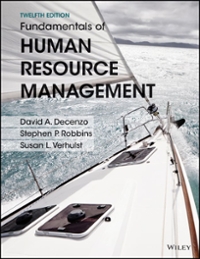Exactitude Manufacturing implemented a new compensation system a year ago and it hasnt been very well received
Question:
Exactitude Manufacturing implemented a new compensation system a year ago and it hasn’t been very well received by their employees. Pay grades were reduced from six to five, and pay was tied to skills, training, and level of responsibility rather than seniority. As a result some of the most senior and highly skilled workers are already at the top of their pay grades. They haven’t had a raise in a year and will only see slight pay increases for several years to come. They are understandably frustrated and have been complaining to coworkers, supervisors, human resource managers, and anyone else who will listen.
The problem has been particularly difficult in the St. Louis Missouri facility. Several employees have posted their complaints on Twitter and their personal Facebook pages. To make matters even worse, a satirical music video has surfaced on YouTube featuring several Exactitude employees and depicting Exactitude managers as clueless, inept, and money hungry. Older workers are pictured sitting in trash cans portraying them as pushed aside because of their age. The video is gaining in popularity and a local TV station has featured it in a news segment that casts Exactitude in a negative light. Even more troubling is the recent appearance of radio and television ads on local stations that explain the benefits of union membership. The ads are probably directed at the disgruntled Exactitude employees.
HR Director Shannon Keller was called to the facility to meet with nervous managers and supervisors. Their questions came quickly.
Anthony, the plant manager asked “What if we offer to go back to the old pay plan if they agree not to talk to union organizers? I think that would make them happy.”
Bert, a production supervisor, explained, “I’m pretty sure they made the video in the factory on their breaks, and sent it with their company e‐mail accounts. Should we discipline them for that?”
Carla, another production supervisor, said, “I think there’s an information meeting planned with the union. I know where it is. I can go there and see who is interested. If it’s the older guys in the video we could offer them early retirement and that would take care of the problem.”
Tyler, a manager at the facility, added, “Everyone shouldn’t be so concerned. Acme Manufacturing had a union when I worked there and it wasn’t bad at all. The management worked closely with the union on all sorts of issues and everyone got along really well. I was there five years and we never went on strike.”
Quang, another manager, agreed. “I don’t think it’s going to be a big problem. There’s a rumor that if a union is certified, Exactitude will shut this plant down and move production to one of the other three plants. That will probably scare enough people that the union will never get certified,” he added.
Shannon interrupted the discussion. “You’ve brought up some really important issues, and I need your cooperation in clearing up some misconceptions before we do anything at all.”
Questions:
1. Evaluate the different concerns of Anthony, Bert, Carla, and Quang from legal and ethical perspectives. Which actions are problematic and why?
2. What are the steps employees need to take if they wish to certify a union to represent them?
3. Suggest ways that Exactitude could establish a situation similar to the one Tyler described if a union is certified.
4. Research: Find examples of ways unions use social media to recruit membership. What social media sites are used and how effective are the union messages?
Step by Step Answer:

Fundamentals Of Human Resource Management
ISBN: 9781119032748
12th Edition
Authors: David A DeCenzo, Stephen P Robbins, Susan L Verhulst





